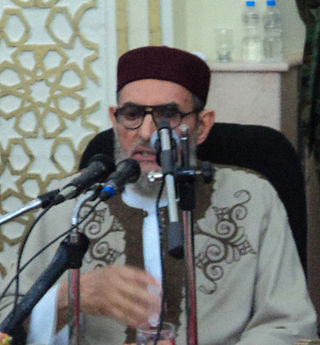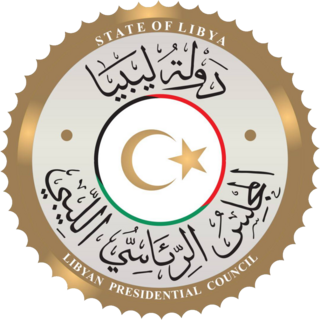
Benghazi is the second-most-populous city in Libya as well as the largest city in Cyrenaica, with an estimated population of 1,207,250 in 2020. Located on the Gulf of Sidra in the Mediterranean, Benghazi is also a major seaport.

Shukri Mohammed Ghanem was a Libyan politician who was the General Secretary of the General People's Committee of Libya from June 2003 until March 2006 when, in the first major government reshuffle in over a decade, he was replaced by his deputy, Baghdadi Mahmudi. Ghanem subsequently served as the Minister of Oil until 2011. On 29 April 2012, his body was found floating on the New Danube, Vienna.

The dinar is the official currency of Libya. The dinar is divided into 1,000 dirhams (درهم). It is issued by the Central Bank of Libya, which also supervises the banking system and regulates credit.
Imbarek Shamekh is a Libyan politician and bureaucrat. He served as the Secretary-General of General People's Congress of Libya from 2009 to 2010. He previously served as Deputy Prime Minister from 2008 to 2009, and Prime Minister from 2000 to 2003.
Farhat Omar Bengdara is a Libyan politician and the Chairman of the National Oil Corporation. He is a banker who was the governor of the Central Bank of Libya (CBL) until he defected to the anti-Gaddafi side in the course of the Libyan Civil War. He left Libya for Turkey, which had directs flights and no visa requirements, on 21 February, but was formally in office until 6 March, when the government realised he would not return.

The Libyan House of Representatives is the legislature of Libya resulting from the 2014 Libyan parliamentary election, which had an 18% turnout. On 4 August 2014, in the course of the progressing August 2014 Islamist coup in the capital Tripoli in the context of the Libyan Civil War, the House of Representatives relocated itself to Tobruk in the far east of Libya. Several HoR sessions were held in Tripoli in May 2019 while Tripoli was under armed attack, electing an Interim Speaker for 45 days. Between 2014 and 2021, the House of Representatives supported the Tobruk-based government led by Abdullah al-Thani before supporting the incumbent Government of National Unity led by Abdul Hamid Dbeibeh. In September 2021, the House of Representatives passed a no-confidence motion against the interim GNU government and later appointed a rival Government of National Stability (GNS).

Al-Sadiq Abd al-Rahman Ali al-Ghariani has been the Grand Mufti of Libya since 2012. He is a Muslim imam of the Maliki school of thought. Academically he is a seated professor in the College of Sharia in the University of Tripoli since 1969 and distinguished contributor the Maliki school of thought with his numerous publications.

The Libyan crisis is the current humanitarian crisis and political-military instability occurring in Libya, beginning with the Arab Spring protests of 2011, which led to two civil wars, foreign military intervention, and the ousting and death of Muammar Gaddafi. The first civil war's aftermath and proliferation of armed groups led to violence and instability across the country, which erupted into renewed civil war in 2014. The second war lasted until October 23, 2020, when all parties agreed to a permanent ceasefire and negotiations.

The Presidential Council is a body formed under the terms of the Libyan Political Agreement which was signed on 17 December 2015. The Council carries out the functions of head of state of Libya and is proposed to command the Libyan Armed Forces.

Fathi Ali Abdul Salam Bashagha, known simply as "Fathi Bashagha" or occasionally Fathi Ali Pasha, is a Libyan politician and the former interim prime minister of Government of National Stability. He served as Minister of Interior from 2018 to 2021.

The Libyan peace process was a series of meetings, agreements and actions that aimed to resolve the Second Libyan Civil War. Among these were the Skhirat agreement of December 2015 and the plans for the Libyan National Conference in April 2019 that were delayed because of the 2019–20 Western Libya campaign.
The 2020 Libyan protests consisted of street protests over issues of poor provision of services in several cities in Libya, including cities controlled by the Government of National Accord (GNA) in the west and by the Libyan National Army (LNA) in the east (Benghazi) and south (Sabha) of Libya.

Mohamed Yunus al-Menfi is a Libyan diplomat and politician. On 5 February 2021, he was chosen as the president of the Libyan Presidential Council at the Libyan Political Dialogue Forum. Previously, he had served as the Libyan Ambassador to Greece.

The Government of National Unity is a provisional government for Libya formed on 10 March 2021 to unify the rival Government of National Accord based in Tripoli and the Second Al-Thani Cabinet, based in Tobruk. Abdul Hamid Dbeibeh is the Prime Minister of the unity government and was selected in the Libyan Political Dialogue Forum on 5 February 2021. It is de facto backed by the governments of Turkey, Qatar, Algeria, and Pakistan.

The Red Castle, in Arabic As-saraya Al-hamra, sometimes also Red Fort or Red Saraya, is a major landmark on the waterfront of Tripoli, bordering Martyrs' Square. It has been the home of the Red Castle Museum since 1919, and of the Libyan Department of Archaeology since 1952.

The Government of National Stability is a provisional government of Libya based in Benghazi that formed on 3 March 2022, led by Osama Hamada and supported by the House of Representatives and the Libyan National Army. Since its inception, the government has claimed power over Libya in competition with the Government of National Unity led by Abdul Hamid Dbeibeh, with the Libyan Political Dialogue Forum coordinating the ceasefire agreement.

Saddam Haftar is a Libyan military officer and politician, and the son of Libyan warlord, Khalifa Haftar. He is the commander of the Tariq Ben Zeyad Brigade and holds several other high positions in his father's Libyan National Arab Army. He frequently travels abroad to make diplomatic visits to Arab and foreign countries and has been seen as the likely successor to his father.















